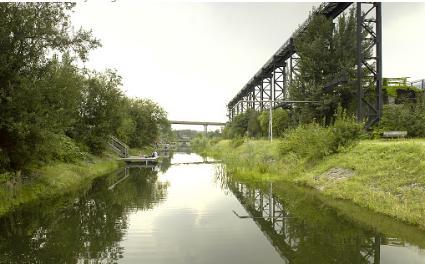
- Since 2011, the EIB has supported this generation-long project with loans totalling €1.8 billion.
- Germany’s once dirtiest river will be completely free of sewage from 2022.
- The end of coal mining in the central Ruhr area will increase the quality of life and create new jobs.
For the European Investment Bank (EIB), the clean-up of the Emscher River in the Ruhr region is a lighthouse project requiring the construction of a completely new wastewater management and treatment system.
Since 2011, the EIB has supported this generation-long project with loans totalling €1.8 billion. The last tranche of €500 million with a term of 45 years was signed at the end of 2020, securing long-term low interest rates for the German wastewater management company Emschergenossenschaft.
With the completion of the river restoration, EIB President Werner Hoyer highlights the exemplary nature of the project: “It shows how a region shaped by decades of industry can be restored to a near-natural landscape. The people of the Ruhr region are not only being given back a river, but also their quality of life. I am therefore extremely proud that we, the EU bank, are supporting the Emschergenossenschaft in this very important project.”
Projects like the Emscher restoration are central to a sustainable environment and climate protection. Hoyer sees the greatly improved quality of life as the key to attracting new companies and creating new jobs with the end of mining in the region. “It is precisely these projects that testify to what Europe does for its people in concrete terms,” he says.
The Emscher restoration project offers the opportunity of the century to give the urban landscape in the Ruhr region between Holzwickede and Dinslaken a facelift. The goal is also to transform the Emscher region into an attractive place to live and do business through projects that extend far beyond the river by sustainably improving people’s living and working environment.
A structural change began in the 1980s with the end of coal mining, in which traditional heavy industry gave way to high technology and the service sector. According to a study by the University of Dortmund, 44 000 new jobs have been created in the region so far as a result of the Emscher restoration project.
In 1992, the public sector entity Emschergenossenschaft, which has been responsible for wastewater management since 1899, pushed ahead with the work on this generation-long project together with the neighbouring municipalities. A total of €5.5 billion has been invested to date. At the beginning of the 1990s, the Emscher was still considered the dirtiest river in Germany, as for decades wastewater from mining, industry and households was discharged into the concrete riverbed and left untreated for a long time.
To be able to restore the 80-kilometre-long concrete riverbed to a near-natural state, an underground sewage system with modern water treatment plants was built, from which the treated wastewater is discharged into the Ruhr. As of this year, the Emscher River has been completely free of sewage, making it one of the cleanest rivers in Germany.
Background information
The EIB’s activities focus on the following priority areas: climate and environment, development, innovation and skills, small and medium-sized businesses, infrastructure and cohesion. The EIB works closely with other EU institutions to foster European integration, promote the development of the European Union and support EU policies in over 140 countries around the world.